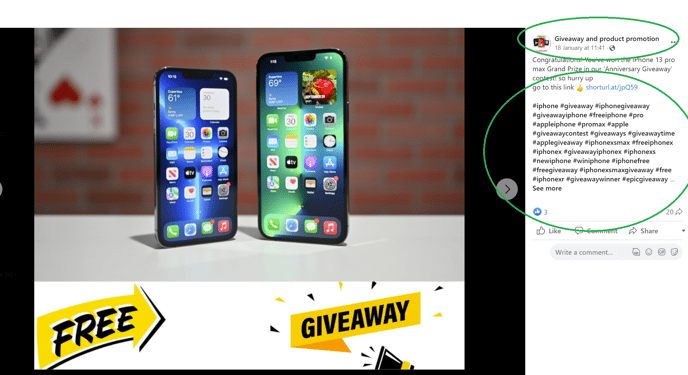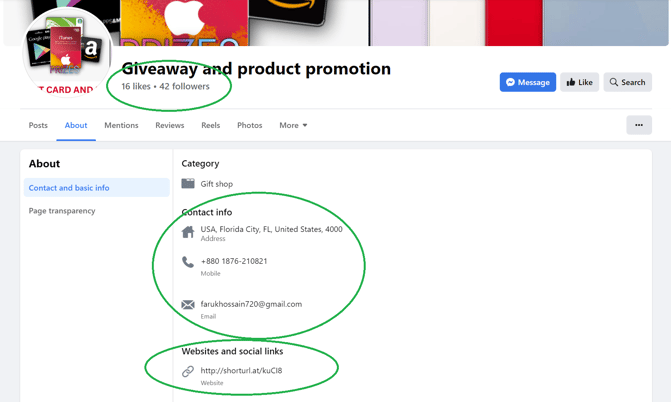So, we came across a fake raffle page. And while the page is gone now, we figure it won’t be the last.
Lottery fraud (also known as scamming) is common – so common, that the Better Business Bureau’s 2018 study on Sweepstakes, Lottery, and Prize Scams found that between the FTC, the Internet Crime Complaint Center, and the Canadian Anti-Fraud Centre, over 500,000 complaints were filed from 2015 – 2017. We can guarantee this number is only growing.
So, how can you protect yourself and your ticket buyers from online scams? We’ll get there, but first, let’s make sure we can spot a fraud.
Know the warning signs of a fake raffle.
🚩 Someone reaches out saying you’re a winner but asks for payment to redeem your prize.
🚩 Someone contacts you about winning a prize, but you didn’t enter a raffle.
🚩 Someone asks for sensitive information like your Social Insurance Number or bank account information.
🚩 You receive an email about winning a raffle from a non-official email address (as in, it’s not attached to the organization. This isn’t necessarily a deal breaker, but certainly a red flag.)
🚩 The organization contacting you claims to be a government entity (or affiliated with one.) We know raffles, and we guarantee – the government doesn’t run them.
Don't let this info put you off from buying raffle tickets or hosting your own raffle! Here are some tips to ensure you're joining a legit raffle.
1. Check for the raffle or gaming license number.
It depends on where you live, but most online raffles need a license to operate. If you suspect a raffle is fake, check out the raffle license number. On Rafflebox raffle pages, you’ll always find the license number under the ticket prices on the right-hand side or under the “Rules” tab.
2. Verify the organization.
If a charity is hosting a fundraiser, you best believe they’re using all their digital real estate to promote it. Check the organization’s name then do a quick Google search – if the raffle is legit, they’ll be sharing it on their website and/or social media platforms.
3. Check the rules.
Organizers need a clear set of rules for their 50/50s, prize draws, or other raffles – and these rules must be laid out for ticket buyers. If no rules and regulations are listed on the page where you buy a ticket, there’s a chance the raffle is a scam.
Rafflebox raffle pages always have a “Rules” tab, and this section will always include information like:
-
The draw date and location.
-
When ticket sales end.
-
Eligibility criteria.
.png?width=417&height=525&name=Marketing%20Clients%20(49).png)
Check out the raffle’s rules and regulations. If any of this information is missing, there’s a high chance it’s not legit (or if it is, the organizers didn’t know they legally have to list the raffle rules).
Bonus: Spot a Facebook scam.
How could we talk about online scams without referencing Facebook?
Scammers create fake Facebook “like and share” contests to steal our data and use it for marketing purposes (or even to sell.) Worst case scenario, engaging with these posts may even trigger a virus on your computer.
The Nova Scotia Firefighters run their (legitimate, licensed) raffles through Rafflebox. As you can see, they have a substantial amount of “likes” and “followers”, which is a good sign the account is real.
.png?width=317&height=525&name=Marketing%20Clients%20(50).png)
Take a peek at the page’s “About” section – does the address and website look genuine? (In this case, they sure do!)
Another clue is the “creation date” of a page. Is the page brand new or has it been around for a while? If it’s a fresh page hosting a big raffle, something might be fishy.
.png?width=372&height=537&name=Marketing%20Clients%20(51).png)
Now let’s look at a fake Facebook giveaway.
First, check the organization’s name—does it sound legit? Look at the giveaway’s post date and the page's “creation date.” Were they close together?
The excessive, vague hashtags are another red flag. Real giveaways don’t rely on spammy hashtags to attract participants.
Other scam signs: low “likes” and “followers,” fake address and phone number, an email linked to a person rather than an organization, and a suspicious URL (probably unsafe to click).

The page’s “creation date” is just weeks before the giveaway. We call shenanigans.

Protect yourself from scams with top-notch technology.
As individuals, we can’t prevent scammers so much as avoid them. As a tech company that supports charities through our platform, we do everything we can to make purchasing raffle tickets a simple, highly secure experience.
Be on the lookout for scams and if you see something suspicious, click that “report” button.
If you’re running a raffle and want to make sure all your Is are dotted and Ts are crossed, get in touch. We’ll set you up and then you’re off to the races (or you’re off to the raffles… we’ll see ourselves out.)
.png?width=500&name=RB%20Blog%20Headers%20(1).png)
.png?width=500&name=The%20Early%20Bird%20catches%20the%20worm%20(and%20bigger%20jackpots).png)
.png?width=500&name=Blog%20header%20hero%20dimension%20(18).png)